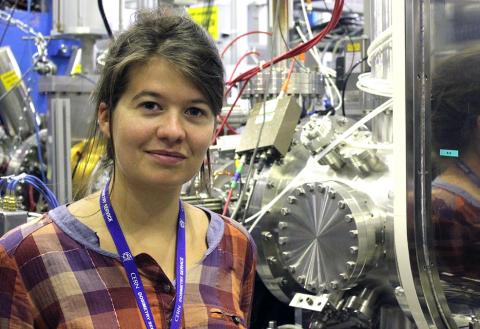
UBC Physics doctoral graduate and former TRIUMF researcher, Chloé Malbrunot was recently awarded a Senior Research Fellowship at CERN, effective this October in Geneva. As a member of the ASACUSA (Atomic Spectroscopy And Collisions Using Slow Anti-protons) Collaboration, Chloé studies the properties of anti-hydrogen and anti-matter.
Before completing her Masters degrees in Vienna, Austria and in Marseilles, France, Chloé was a summer student at CERN where she developed a keen interest in particle physics that brought her to the University of British Columbia to work on her PhD under the supervision of Professor Doug Bryman. Chloé was on hand from the early stages of the PIENU experiment through to its recent completion, which measured rare pion decays with a team of about 25 scientists from 11 institutions worldwide. This size of collaboration is considered relatively small within the field of particle physics, which gave Chloé the chance to experience elements of detector development, data acquisition, and data analysis on a first-hand basis. Chloé credits this experience within the team to her successful application for the CERN fellowship this year.
“I learned a lot from the scientists, technicians and different experts within the collaborative environment at TRIUMF, and am thankful to those from whom I learned for their contribution to this fellowship!” says Chloé.
As a Senior Research Fellow at CERN, Chloé will continue developing the spectroscopy apparatus needed to do precise studies of the properties of anti-hydrogen. The lack of precise and wide-ranging details about anti-hydrogen stands as a great challenge within physics today. Through this experiment, the ASACUSA team will test the validity of the CPT theorem (which is considered a cornerstone of our current understanding of physics) at the atomic level. In addition to her work within the ASACUSA collaboration, Chloé will also become involved in the AEGIS (Antihydrogen Experiment: Gravity, Interferometry, Spectroscopy) experiment, which aims to use anti-hydrogen to test the effect of gravity on anti-matter.
Congratulations, Chloé on your successful fellowship!
-- Written by Ariane Madden, Communications Assistant
